#zuko deserves better
Text

Today I was watching 'The Princess and The Frog'. It's my favorite cartoon along with 'The Beauty and The Beast' and 'Tangled'.
After finished watching it, I realized one thing. Every one of the Disney cartoons I liked had very similar plots.
Basically, 'A woman and a man begin on a rough path and gradually start to know more about each other and then soften and fall in love and they get their happily ever after.'
The thing is, I am subconsciously more interested in movies or cartoons that show change. I'm not into the toxicity that happens in the beginning. I'm into the growth. I care about the overall story structure. Which means...
I couldn't care less about Zutara if it was just this.
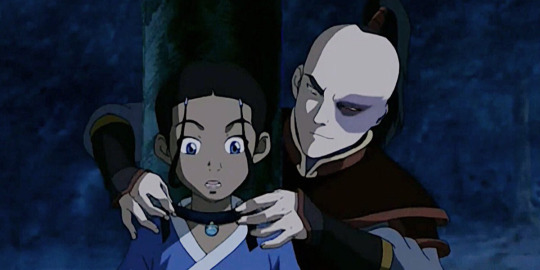
But I care about every single thing that led them from that point to this.
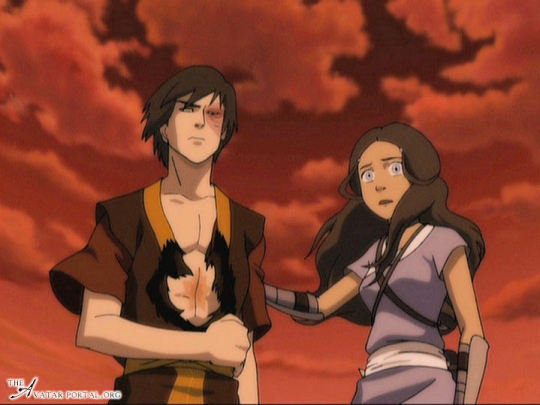
I don't see it improper or toxic. I just see it as a story with a proper build. And I find it interesting. I love it.
In fiction, there are usually two kind of villains:
1. Those who end up toxic. (But fans love them because they're so bad and hot)
2. Those who end up as better people.
(Zuko's hot. So he must me in the first category, right? I mean, he is a villian. Once a villian, always a villian, right?)
Not shaming those who like the first one.
But you have to realize that Zuko is not a stagnant character. He IS a hero. So, you have to regard him as one despite whatever you ship. He's not someone who turns into a beast everytime he comes within 10 meter radius near Katara. He doesn't glitch back and forth between Book 1 to Book 3.
251 notes
·
View notes
Note
Have you ever noticed that people will use Zuko’s ending age when criticizing him, while using the starting age for their favs? The show spanned about a year, and presumably all the characters had a birthday at some point.
If you’re going to call Zuko a 17 year old, then you have to call Azula and Katara 15, and Aang 13. They just want to make it seem like he is so much older than the rest of the gaang, and not also just a kid, same as everyone else.
It's not even so much the age thing that bugs me. It's that those people ignore Zuko's trauma. We see in the story how the worst things Zuko did (and then later to the best of his ability made amends for) were the direct result of years of abuse and neglect by his father. They weren't indicative of his actual character. They were the actions of a child desperately trying to earn his father's love. I bet Aang's kids could relate.
75 notes
·
View notes
Text
Zuko thoughts:
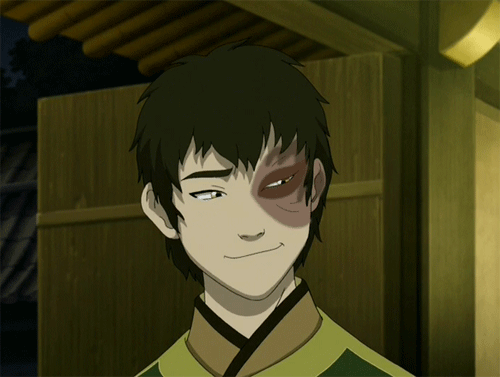
Song that makes me think of Zuko and all the people he loves( Iroh, the gaang, which ever ship you have with zuko. My favorite is Zutara and Zukka) I'm a mess by Ed Sheeran
youtube


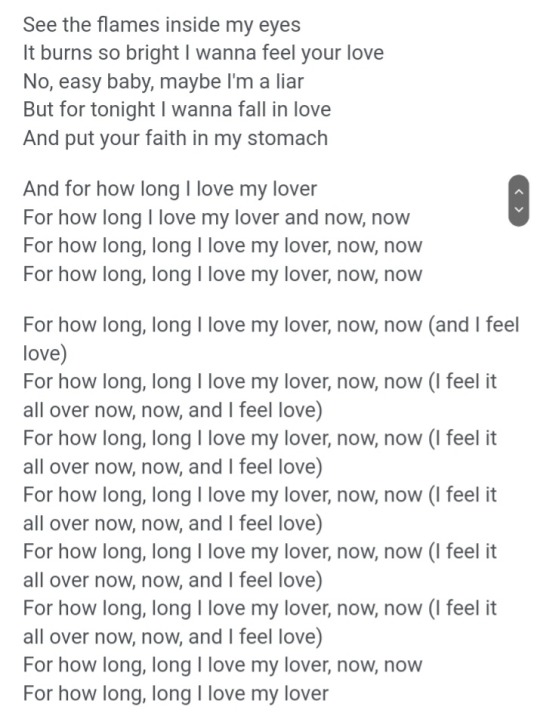
#Spotify#zuko#atla zuko#prince zuko#avatar the last airbender#atla#ed sheeran#i'm a mess#zuko defense squad#zuko deserves better#Youtube
1 note
·
View note
Text
Edit: Yes, the original Sokka sexism arc is great and important. But we don't live in a world where the live action show runners decided to include it in the same form. So:
Unpopular opinion time: Sokka unlearning sexism isn't actually a large part of his character arc--it literally only takes the opening episodes. And removing it COULD be a sign that the live action is taking seriously the complaints I've seen from native fans about the original show runners deciding to make the Water Tribes that sort of sexist to begin with. Sokka's actual character arc is about gaining confidence and leadership skills, and they have the opportunity to focus on that MORE if they change the Kyoshi episode to focus on Suki as a fellow teenager forced into a leadership/protective role in her community and rocking it rather than using her as an object lesson on sexism for a male character to learn from. Whether they will ACTUALLY do that is on them, but it took me less than ten minutes to think up, so I sure hope someone in the writers' room actually cares about using the live action to expand on new angles of the characters. Big ask, I know.
Now the real question is: did they also remove Uncle Iroh's unwanted physical advances on a literally paralyzed Jun, and all of Zuko's snipes about girls? Because THOSE are the actually "iffy" sexism parts in AtLA, not Sokka's five minute arc.
#avatar the last airbender#atla#Sokka#Zuko#Iroh#So help me if Iroh still gropes Jun#Our girl is looking FANTASTIC and she deserves better
4K notes
·
View notes
Text
you ever think about how Zuko had 3 years to come to terms with the fact that his father never loved him and Azula had like. two hours. like Zuko had this whole dramatic character arc where he struggled to do right and Iroh was there to support him meanwhile Ozai was like yeah here’s a hollow title shithead. gonna go burn the Earth Kingdom without you lol. if i got done dirty by my dad as bad as Azula got done i’d start shooting lightning with my hair down too.
#for clarity this is condemning nobody but ozai#avatar#atla#avatar the last airbender#zuko#azula#iroh#ozai#azula deserved better#vulture chatter
6K notes
·
View notes
Text
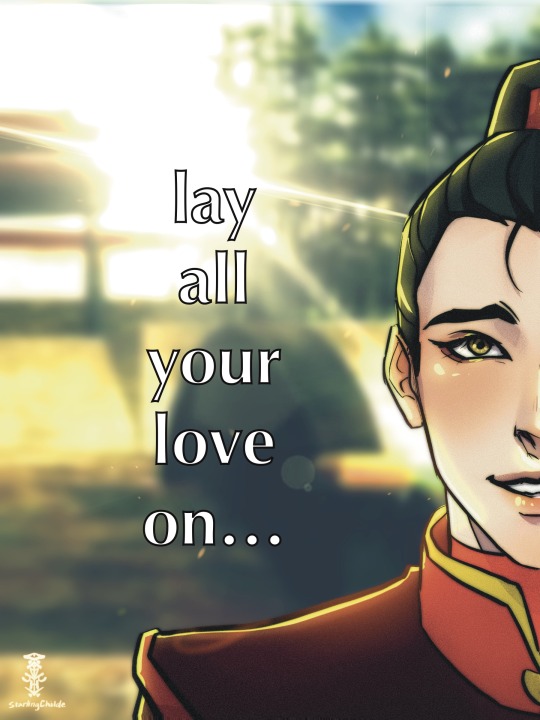
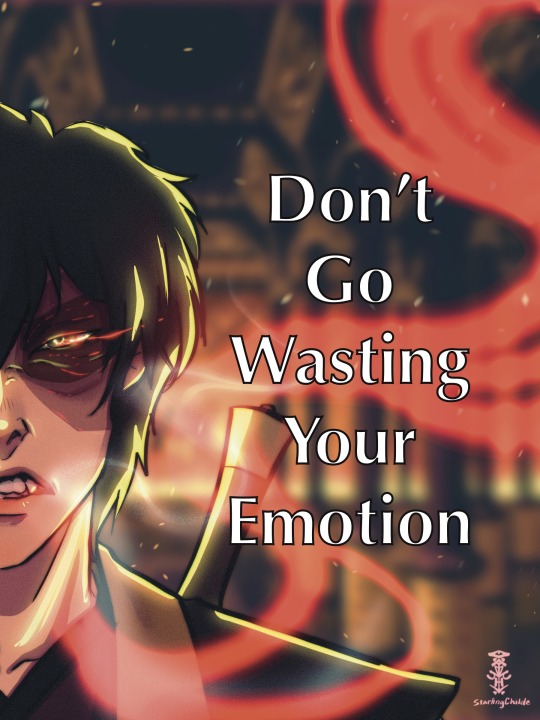
He deserved better
#art#starlingchilde#my art#fanart#zuko fanart#avatar the last airbender fanart#avatar zuko#ATLA#ATLA fanart#Avatar the last airbender#he deserved better
986 notes
·
View notes
Text
Why waste 3 seasons building up the parallels between your protagonist and antagonist, slowly showing how they’re very much alike and their destinies are connected, foreshadowing them eventually working together…when you can just say “I just realized Zuko and I have a lot on our shoulders” in your seventh episode.
Silly writers and their character development…THIS is how it’s done.
#I hate it here#at this point I don’t want to hear you defend this show#this is where they completely lost me#Zuko deserved better#I can’t believe they completely butchered his character#atla#natla#aang#Zuko#avatar: the last airbender#avatar the last airbender#Netflix#atla Netflix#Netflix atla
910 notes
·
View notes
Text
Katara and Mutuality in Relationships
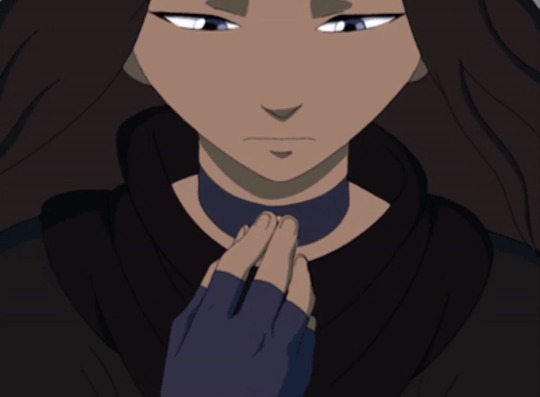
There are lots of conflicting opinions about which characters Katara felt attraction towards, which characters she didn’t, and how long she felt that attraction. I see in most cases, people point to quick clips of her faintly blushing or kissing another character on the cheek as evidence, but I think these kind of takes miss the nuance of the purpose attraction serves in a story.
Most importantly, I see these characters treated as if they are actually people capable of making their own decisions. It’s important to remember that these are fictional characters. They don’t make their own choices; the writers make their choices for them for the purpose of telling a story. From that standpoint, it’s more valuable to examine how a character’s story and narrative themes tie into their relationships with other characters. Animators can shove in a kiss or a blush wherever they want, but it’s harder to demonstrate through storytelling how and why two characters might feel attraction towards one another, and how a relationship between them would develop both characters and contribute to the overarching themes of the story.
In other words, when discussing which characters Katara is “attracted” to, I’m discussing which relationships and actions within the narrative build on her established story and arc. Romance is always integrated into a story for a reason, and considering that reason is important.
Unfortunately, ATLA is very much a product of its time in this way. It’s easy to see what romance adds to the arcs of the male characters—but not so much with the female characters. All three canon relationships (kataang, sukka, and maiko) follow this trend to some degree. The primary purpose of the woman in this narrative is to act as a prize for the man for performing some good deed. Once they’re together, she ceases having her own motivations and becomes an extension of the male character she’s dating. This is pretty blatant with Suki—she barely had a personality in that later seasons; she is there to be Sokka’s girlfriend. Similarly, Katara becomes a completely different character—she’s even animated differently—when the narrative pushes her into romantic scenes with Aang. Her character is flattened.
So what is Katara’s arc, and how do the romantic interactions she has throughout the series contribute to this?
Well, that could be a whole other essay itself, but to put it simply, Katara’s arc is one of a young girl devastated by grief at a young age clinging to hope that she has the power to fight and change the world for the better. Which she does as she gains power and confidence throughout the series—culminating in her defeating Azula in the finale.
But the part I want to focus on here is how Katara connects with other characters. She connects with them over shared experiences of grief and loss.
Take Haru, for instance.
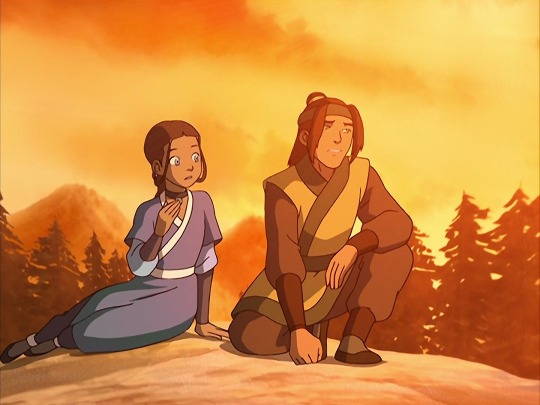
Haru: After the attack, they rounded up my father and every other earthbender, and took them away. We haven't seen them since.
Katara: So that's why you hide your earthbending.
Haru: Yeah. Problem is…the only way I can feel close to my father now is when I practice my bending. He taught me everything I know.
Katara: See this necklace? My mother gave it to me.
Haru: It’s beautiful.
Katara: I lost my mother in a Fire Nation raid. This necklace is all I have left of her.
Haru: It’s not enough, is it?
Katara: No.
This isn’t just a throwaway moment; it’s an important character moment that leads up to growth and the progression of Katara’s overall story, both in this individual episode and in the whole series.
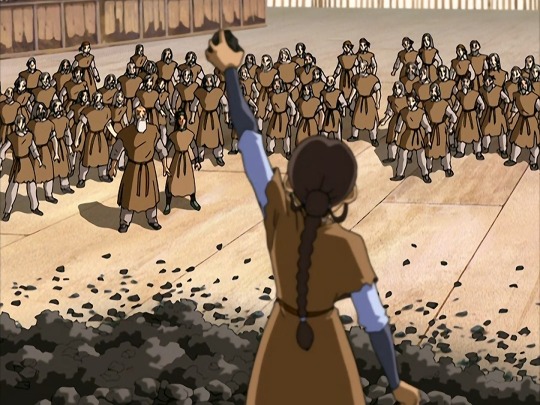
Katara finds her power in the connections she’s able to make with other characters. It’s a powerful driving force for her that makes her a strong character even before her bending abilities develop. Imprisoned was such an important episode to establish who Katara is and what her power is, and adds so much to her arc.
But there is one line in particular from the above exchange that also stands out: Haru says “it’s not enough, is it?” and Katara agrees. Even this early in the series, we’re establishing the fact that despite her drive and hopeful outlook, Katara feels deeply hurt, she feels a deep sense of loss that she opens up about to other characters in moments like these. But unlike Haru…Katara can’t go rescue her mother. Her mother is dead, and we see her grapple with that grief throughout the series.
Another character she reaches out to like this is Jet.
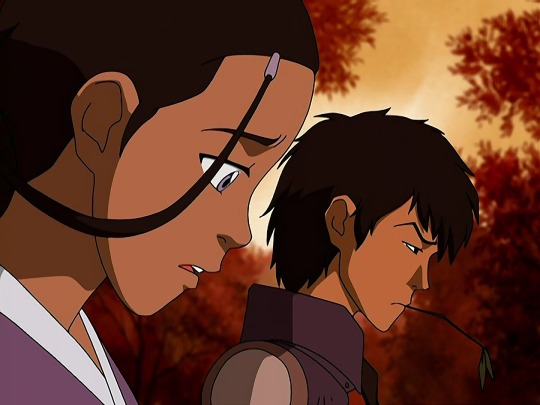
Jet: Longshot over there? His town got burned down by the Fire Nation. And we found The Duke trying to steal our food. I don't think he ever really had a home.
Katara: What about you?
Jet: The Fire Nation killed my parents. I was only eight years old. That day changed me forever.
Katara: Sokka and I lost our mother to the Fire Nation.
Jet: I’m so sorry, Katara.
Another important note about Jet is that there are explicit romantic feelings from Katara in this episode. Again, Katara empathizes with another character through a shared sense of loss. Sadly, in this case, Jet manipulated her feelings and tricked her into helping in his plot to flood the village…but those feelings were undeniably there.
That was the tragedy in this episode, but it also gives the audience so much information about Katara as a character: what motivates her, and what she wants. Katara is established as a character who wants someone who will connect with her and empathize with her over her loss—her greatest sense of trauma. She wants to help others but also receive support in return. The reason why she was smitten with Jet, beyond just initial attraction, is because he gave her a sense of that before Katara realized his true motivations.
A lot of people make the claim that Aang is good for Katara because he also feels a sense of great loss and trauma. And while on paper that’s true…does he really demonstrate that? I just gave two examples of characters Katara connected with this way, and both responded with deep empathy to what she said. Very early on in the show—the third episode—Katara attempts to connect with Aang the same way. How does he respond?
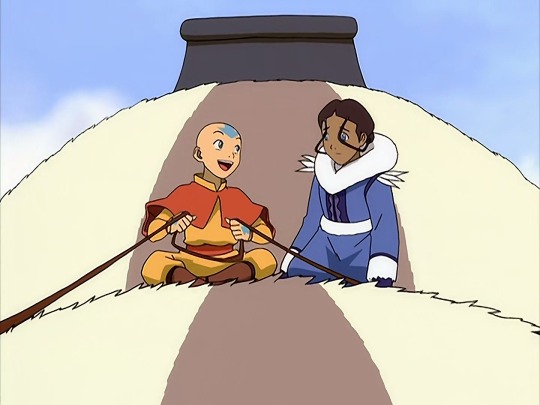
Katara: Aang, before we get to the temple, I want to talk to you about the airbenders.
Aang: What about 'em?
Katara: Well, I just want you to be prepared for what you might see. The Fire Nation is ruthless. They killed my mother, and they could have done the same to your people.
Aang: Just because no one has seen an airbender, doesn't mean the Fire Nation killed them all. They probably escaped!
Just compare this exchange to Haru and Jet. No effort to empathize, not even a “sorry for your loss” or anything. It’s a stark contrast, and the reason for that is because this narrative entirely centers Aang. Katara’s narrative always seems to be secondary to his when they’re together—which is exactly my point when I say this relationship has a fundamental lack of mutuality. It’s built that way from the beginning of the series. It does not add to Katara’s arc nor establish what about this dynamic would attract her.
And, look, before someone jumps down my throat about this…I’m not saying Aang is a horrible person for this response. I think it’s a sign that he’s immature and has a fundamentally different approach to problems than Katara. Katara is a character who has been forced to take on responsibilities beyond her years due to being a child of a war-torn world. Aang’s approach to problems is avoidance while Katara never had that luxury. It doesn’t mesh well.
This is all in Book 1. I honestly could have gotten on board with Kataang if the series meaningfully addressed these issues…but it didn’t. In fact, they actually got worse in some ways.
Back to Katara’s mother. We’ve established that this is a core part of Katara’s character and like in the scene with Haru, she indicates that this is an unresolved issue that pains her. But then, in Book 3, Katara actually does get a chance to confront this pain.
This would have been a powerful moment. Surely the character who is meant to be her partner, her equal, would have been there for her. Surely he would have understood and supported her, fulfilling her narrative and adding to her story.
But Aang didn’t do that. I won’t go into details because there are a million analyses out there on The Southern Raiders, but Aang’s response to Katara was the opposite of understanding. He got angry with her, insinuated that she was a monster for wanting revenge, and tried to dictate her behavior according to his own moral values. And importantly, from a narrative standpoint, he did not go with Katara. One of the most important events in her arc, and Aang didn’t support her—he actually tried stopping her. He didn’t contribute to her growth and development.
Also noteworthy:
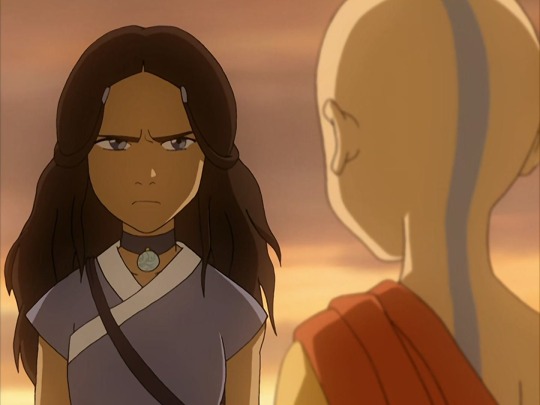
Katara: But I didn’t forgive him. I’ll never forgive him.
Even at the end of the episode, Aang clearly doesn’t understand at all what Katara is feeling. This line demonstrates it perfectly. He thinks she forgave him when that wasn’t the case at all…but of course, he didn’t even accompany her, so he didn’t see what actually took place. His worldview is fundamentally different from hers, and he’s consistently too rigid in his morality and immature to center Katara’s feelings.
Throughout Katara’s whole arc, her most significant character moments, Aang’s character just doesn’t come through the way Katara’s constantly does for him. Their narrative lacks mutuality. When Katara and Aang are together, she becomes an accessory to him. The ending scene is a perfect demonstration of this.
Now, to address the elephant in the room.
Which character does actually add to Katara’s narrative and support her growth as a character?
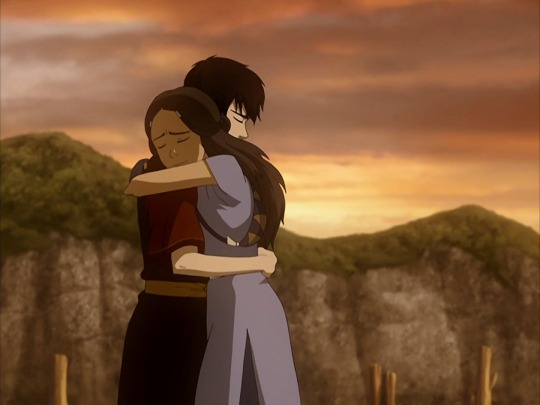
Correct! I just talked about how important The Southern Raiders is to Katara’s character and story, how it’s a chance for her to finally address the grief she’s been carrying since Book 1. And who stood by her side throughout this pivotal moment? Right—Zuko did.
You can talk all you want about how he’s a “colonizer” while Aang’s people suffered genocide, but you’re forgetting that “show, don’t tell” is one of the most basic aspects of storytelling. The fact is, despite how it looks on paper, Zuko was the one there for Katara at her critical moments. Zuko empathized with Katara more than Aang ever did—as demonstrated in this episode. Zuko never once brought up his own cultural values. Zuko never once told Katara what to do. Zuko’s position was that Katara should be the one to decide, and that he would support any choice she made. He supported her decision to spare Yon Rha, but he would have also supported her if she decided to kill him. I actually found this episode to be a satisfying reversal to what is typically seen in TV—for once, the female character is centered while her male counterpart takes the backseat and becomes a supporting role to her narrative.
Even before this, Zuko is shown to empathize with Katara.
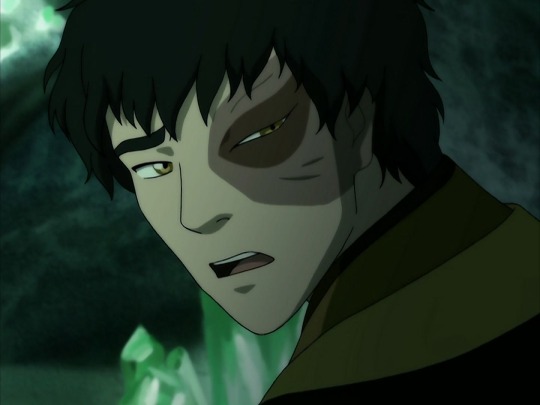
Zuko: I’m sorry. That’s something we have in common.
I think what gets me about this scene is the fact that he’s still Katara’s enemy, and she was just yelling about how she hates him and his people. But despite that, Zuko still empathizes with Katara. She is fundamentally human to him, and he expresses that to her in a way that allows them to connect. Zuko stands to gain nothing from this. It’s true that Azula entered the picture and twisted things around—but in this moment, Zuko’s compassion is genuine. His instinct was to respond to her grief with empathy, just like she consistently does for other characters.
And finally, how else does Zuko add to Katara’s arc?
I don’t think there is any more perfect of an example than the finale itself—the culmination of the arcs and development of all characters.
Zuko and Katara fight together. In a heartbeat, Zuko asks Katara to fight by his side against Azula, because he trusts her strength. She’s his equal—both in his mind, and in a narrative sense.
Then, this:
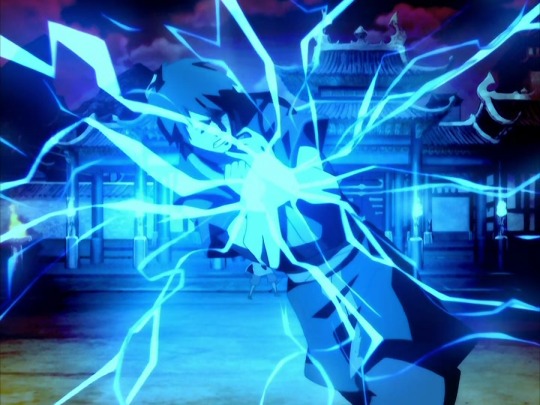
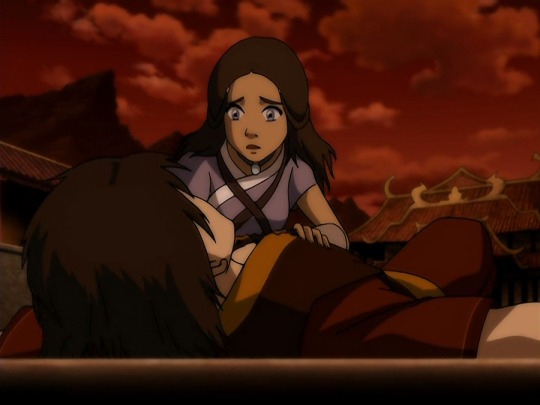
Both of their roles are so critical in this fight. They both save each other. The scene has such raw emotion to it. These characters were together at the conclusion of their respective arcs for a reason.
This is the perfect conclusion to Katara’s arc. She just played a critical role in ending the war that has caused her trauma her whole life. She just demonstrated her mastery of waterbending (another thing she’s dreamed of throughout the series) by defeating the world’s most powerful firebender during Sozin’s Comet. Even though she had help as all characters do, these are victories that belong to her and demonstrate the growth and power of her character. And to top it all off? She was able to save Zuko’s life. She didn’t have to endure the pain of feeling helpless to do anything while someone else died for her; this time, she had an active role, she changed her fate, and she prevailed. Zuko plays an important role in Katara’s story without dominating it. They perfectly represent mutuality. They add to each other’s stories. Their narratives become stronger when they’re together, without one diminishing or sidelining the other.
So, from that standpoint, that’s why I always see the attraction between Zuko and Katara and why I see it lacking between Aang and Katara. Zuko and Katara’s story doesn’t need some cheap little throwaway moments to shine. It’s integral to both characters’ stories. We are shown not told of the way these characters feel about each other. Given everything we know about Katara, her goals, her values, her past loves…absolutely everything points to Zuko being the true subject of her feelings.
Because let’s be honest. The ending I just described is so much more powerful and so much more Katara than seeing her being relegated back to a doe-eyed love interest for Aang to kiss. It hardly even made sense—Katara played no role at all at the culmination of Aang’s arc. She was relegated back to a love interest, rather than the powerful figure we saw fight alongside Zuko.
#zutara#katara#zuko#atla#anti kataang#canon critical#jet#haru#katara deserved better#aang critical#meta#analysis
387 notes
·
View notes
Text
I know people have already talked about this topic, but I want to too.

There are a lot of jokes on the Internet about how Katara constantly mentions her mother as if it were the most important event, but...
Isn't that so? I mean, in the life of a little eight-year-old girl, this is truly the most important event in her life and she wants to share it.
Katara took on the role of an adult too early, and she didn't have the opportunity to work through this problem with anyone, because she's already an adult => she cannot afford to rely on someone. But she needs it, and that's what traveling with Aang gives her: the opportunity to find children like her and share with them the burden that she has been carrying all this time. Note that Haru, Jet, and even Zuko are people who not only have experienced loss, but also have some kind of responsibility for others: for their family or even for a group of people. She doesn't tell adults about this because she isn't looking for care, she's looking for understanding of her feelings.
The problem is that it's not enough for her. Her sadness turns to rage because the further the story goes, the less satisfied Katara becomes.
The closer the heroes get to the end of the war, the more angry Katara gets: first at her father, then more specifically at Zuko. And, in the end, she finds the cause of this anger, as well as the opportunity to satisfy the thirst for understanding of her grief - the murderer of her mother. She needed revenge not just because it was fair, but because from the very beginning of the series, Katara was looking for an opportunity to calm those feelings that were rushing out. And her attempts to do this by expressing the problem were not enough. She needed more, and she got it by facing the biggest monster in her life.
In general, the “monster” metaphor obviously speaks not only about Yon Ra, but also about Katara herself. Or rather about her anger. Judge for yourself: she had to restrain a storm of emotions from the age of eight; she began to reveal her grief only in the first season, that is, at the age of 14. She ignored her pain, pushing it deep inside until it became a raging monster rushing out. And what Katara really needed was to face it. So when she flies to find Yon Ra, she also finally meets the version of herself that she has carefully ignored and hidden for the benefit of others.
It's funny that Zuko is the one who helps her. In general, it was his complete understanding of Katara in this matter that amazed me. He, like no one else, knows what it’s like to face your inner demons and knows how useful it is for knowing yourself. And how dangerous it is when you're alone in it. So he accompanies her to keep her safe. So that she has a person on her side who will be there, no matter what choice she makes. He will support anyone. (I'm crying because of how beautiful it is wasgffv💖)
(A small antikataang insert: this is the reason why their relationship doesn't work. Aang only supports the right decisions, even if they require Katara to sacrifice inner harmony, while Zuko will simply support her for whatever choice she makes. It's funny because Aang has to keep balance and as a monk he knows a lot about that. The show focuses heavily on the theme of yin and yang, that is, the balance of good and evil. In order to achieve internal balance, Katara needed to turn to internal evil, because she tilted this scale towards good. She was imbalanced to begin with, and instead of understanding this, Aang insisted on continuing the preponderance of good. It’s as if he doesn’t understand that the preponderance of good is as bad as the preponderance of evil, and this will only harm Katara. I hope my point is clear)
Finally, Katara finds inner peace when she faced everything that was raging inside her, when she did what she needed and poured out everything she ever wanted. Every word about her mother led us to this moment, as did Katara herself.
And do you know what the point is? Why am I telling all this? It's all a character arc that unfolds linearly over three seasons.
Now think back to the arc of Aang, the main character of the show, in relation to his family. Did he bring them up in seasons two and three in a way that was linear? I mean, the one who constantly grieves over his father's death should have been Aang, because he learned the pain of loss so recently, he didn't have a chance to get used to it. But even in the episode SR, Aang compares the loss of mother not to the loss of his mentor and father, but to the loss of Appa and his people. It’s as if he doesn’t care about the individual connection with Gyatso and it’s nominal.
Katara, on the other hand, has emotions that she smoothly carries throughout the show and resolves in it. She has a huge number of Chekhov's guns, which each fire at its own time. Her feelings about her mother, the development of these emotions and their resolution are the most beautiful thing about this show along with Zuko's arc (even though I have problems with him in book 3).
And making derogatory jokes about it like Katara is whining and annoying is blasphemy. After all, she's the only one of the Gaang who has a single development arc throughout all three seasons, this must be respected
#atla#atla critical#avatar the last airbender#atla meta#anti kataang#anti aang#katara#zuko#zutara#katara supremacy#katara is the real main character change my mind#katara deserved better#katara meta#southern raiders
350 notes
·
View notes
Text
I can't believe how mixed-up the fandom (and the LOK writers) get Katara and Zuko's characters.
I want to make this clear, just because she grew up during the war, doesn't mean Katara was forced to fight. I honestly don't know where people get this from. Her cultural norms very blatantly dictate for her not to. It was something she vehemently struggled against to be able to do. It was always her initiative and choice to fight because that's who Katara is; a warrior.
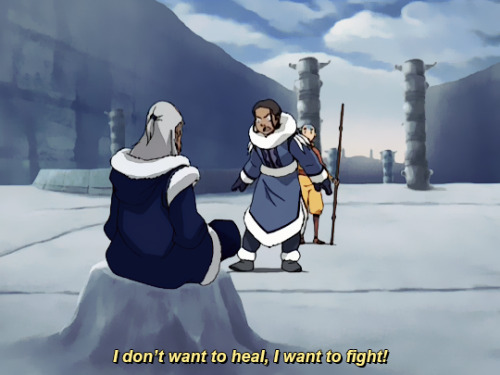
Hell, she's even reveled in dominating her opponents and showing off her skills in battle
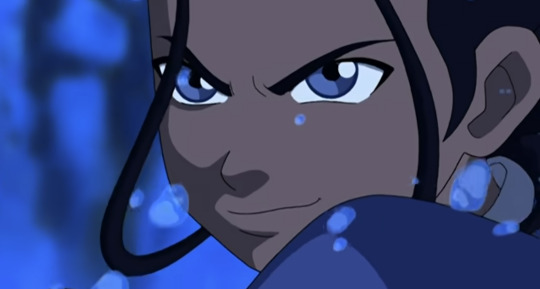
But you know who was forced to fight? You know whose skewed concepts of honor dictated him to fight? You know whose society urged him towards participating in war? You know who was the most at-ease and relaxed working peacefully in his uncle's tea shop?

The entire concept of Zuko's character is that he doesn't easily thrive as a warrior and doesn't enjoy fighting if he can avoid it. One of the key things he learns post-redemption is that fire isn't just a force of destruction, it's also life and passion. And that's what allows him to be a better firebender later.
So it makes no sense that Katara gave up on fighting before Zuko. And don't misunderstand, both of them should have been still relatively active (because Zuko is a warrior too and the point of this post is not to claim he isn't). But between the two of them, Zuko would have been the one to embrace peace and retire
#katara deserved better#zuko deserved better#?#not really since out of the gaang he got the best deal#give katara her statue#AND THAT'S ANOTHER THING#if anyone would be “humble” about a statue it would have been zuko#katara would have loved that shit#i still can't believe they didn't give my girl her due respect#that one thing almost ruined lok for me#lok critical#i still love it#but they did katara dirty#katara#zuko
203 notes
·
View notes
Text
How bad is it that at 8 years old, Azula lost her mother, and at the same time 14 year old Azula is convinced her mother thought she was a monster
How much scolding and clashing was there between a parent and child, for an 8 year old to get that much of an impression and that it stuck with them that much into their mid teens?
Also, have you seen 8 year olds? Why would you ever turn your back on one? How the hell could you not assume the 8 year old with fire powers isn't going to burn things just because "fire is cool" or "I'm upset"
It's basically an extension of a benders body, so of course this angry kid, with no real gage for how she could hurt others is going to burn things, or pinch Zuko with fire when he tells on her
She was 8!
#azula#ursa critical#zuko#if Ursa could control how she reacted to Zuko she could control how she reacted to Azula#azula deserved better
303 notes
·
View notes
Text
if zutara would have happened the azulon statue would have been replaced with katara i don’t have proof of this except vibes
#zutara#red rambles#zuko x katara#katara x zuko#pro katara#katara deserved better#katara statue#zutara headcanon
245 notes
·
View notes
Note
An annoying trend I noticed in the fandom is that they make it as if Zuko personally killed Aang in CoD when it was Azula. It's so weird. Yes, Zuko did play a part in his death by helping Azula, but he never shot the lightning. That was all Azula. What he did in CoD was still bad ofc, I'm not downplaying that, but oof. Do these fans forget the story or?? Like stop blaming my boy for something he didn't do!
I haven't noticed that. Thankfully I seem to have anyone who would say that blocked for the most part. But in response to that argument, I'd like to point out that Zuko never tried to kill anyone. Even in the cave, he wasn't actively trying to kill anyone. If he's guilty of anything, it's his short-sightedness in not understanding what his father had planned for anyone he did manage to capture.
43 notes
·
View notes
Text
Fandom: "Katara is Aang/Gaang mother"
Katara:
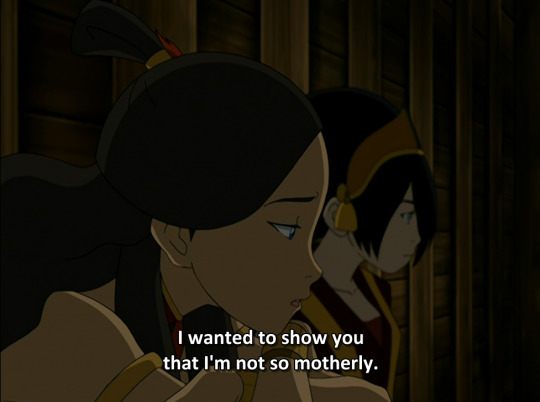
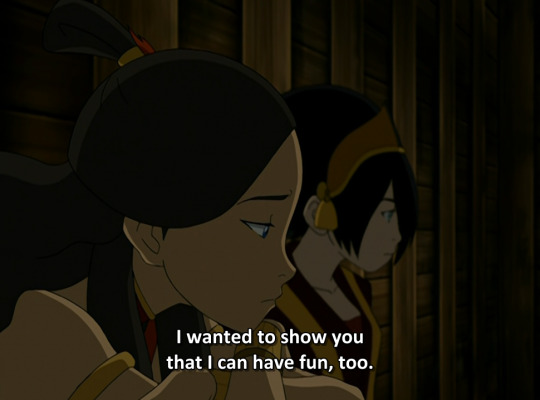
Y'all should rewatch this episode. No actually, rewatch the whole series. Properly :)
#avatar the last airbender#atla#katara#aang#toph beifong#zuko#kataang#katara i'm so sorry#you deserve better#mischaracterization#she's a CHILD#a child with a trauma
261 notes
·
View notes
Text

this scene happened in my head so it's real
#avatar the last airbender#zutara#katara x zuko#katara fanart#zuko fanart#atla fanart#katara deserved better#zuko deserved better#fanart#fanon
218 notes
·
View notes
Text
The number of fans I've seen turn their back on Kataras's character due to the Southern Raiders episode is astonishing and incredibly painful. In fact, it makes me wonder how people cannot consume media critically when the objective of the show is to create nuanced and well-rounded characters that almost reflect normal human beings like you and me. However, when a character who is usually good and who is usually nice and good exudes negative emotions and quite valid ones. How would you feel if you found your mother's murder? Enraged and upset and if you have the power that Katara has I feel that many of us would use it. However, I seen many fans get on a moral high horse and absolutely turn her back on her even after this episode was done. I understand that people are upset at the "you didn't love her as much as I did." Quote said by her to her brother. However, I want you to think about one thing. Imagine being the reason why your mother was killed. You were the one who was supposed to die that night. But your mother replaced your fate. Katara will always love her mother differently because her mother gave her life twice: once when she was born and the other where she protected her daughter by lying that she was the last water bender. She feels guilty for her mother's death. I've seen so many people permanently hate her character after this episode and it feels like people cannot generally understand a well rounded character. I feel that many people tend to coddle the other characters and their trauma, but when it comes to Katara people simply just don't care. Everyone decides to play the trauma olympics , with all of the characters , without understanding that they're all incredibly traumatized and comparing trauma does not help anyone's mental health. But for her it's a complete joke. There's memes and people laugh. In fact, whenever she does bring up her mother It is meant to help others and to be able to help bring comfort to their pain. She doesn't do it out of the luxury of grieving for herself.
190 notes
·
View notes